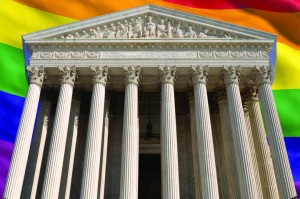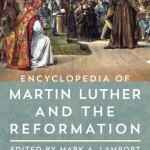 I don’t spend a lot of time reading decisions rendered by the Supreme Court of the United States, but I did today and excerpted a few things with my comment here. There will be more to say and there is already a whole lot of commentary out there, but I thought it would be a good idea to at least start by reading the words of the Court itself. Page numbers cited are to the linked decisions themselves.
I don’t spend a lot of time reading decisions rendered by the Supreme Court of the United States, but I did today and excerpted a few things with my comment here. There will be more to say and there is already a whole lot of commentary out there, but I thought it would be a good idea to at least start by reading the words of the Court itself. Page numbers cited are to the linked decisions themselves.
In striking down the Defense of Marriage Act Justice Kennedy wrote for the majority in United States v. Windsor:
“Private, consensual sexual intimacy between two adult persons of the same sex may not be punished by the State, and it can form “but one element in a personal bond that is more enduring.” Lawrence v. Texas, 539 U. S. 558, 567 (2003).” (p.19)
The citation of Lawrence v. Texas, the landmark case that struck down anti-sodomy laws, here and elsewhere in the decision (decided ten years prior to the very day!) is a significant mark of how much has happened in a decade’s time. It also makes me wonder what we will be deciding ten years from now.
“For same-sex couples who wished to be married, the State acted to give their lawful conduct a lawful status. This status is a far-reaching legal acknowledgment of the intimate relationship between two people, a relationship deemed by the State worthy of dignity in the community equal with all other marriages. It reflects both the community’s considered perspective on the historical roots of the institution of marriage and its evolving understanding of the meaning of equality.” (p.20)
This is a fine reminder that this country has (thankfully) always had an evolving understanding of the meaning of equality. Some choose to see the Constitution in such a way that it can expand, be amended, live and breathe such to let such evolution occur. See also: Thirteenth Amendment, Nineteenth Amendment. Ahem.
“[DOMA] places same-sex couples in an unstable position of being in a second-tier marriage. The differentiation demeans the couple, whose moral and sexual choices the Constitution protects, see Lawrence, 539 U. S. 558, and whose relationship the State has sought to dignify. And it humiliates tens of thousands of children now being raised by same-sex couples. The law in question makes it even more difficult for the children to understand the integrity and closeness of their own family and its concord with other families in their community and in their daily lives.” (p.23)
Segregation and second-class citizenship are not permissible under the Constitution. Citing Lawrence again, because the law protects private, consensual, sexual intimacy between adult persons, laws whose identifiable purpose is to demean certain families on the basis of other people’s dissenting moral views about sex, are impermissible. There is a social and moral good in recognizing integrity in families when in fact they have it.
“The power the Constitution grants it also restrains. And though Congress has great authority to design laws to fit its own conception of sound national policy, it cannot deny the liberty protected by the Due Process Clause of the Fifth Amendment. What has been explained to this point should more than suffice to establish that the principal purpose and the necessary effect of this law are to demean those persons who are in a lawful same-sex marriage. This requires the Court to hold, as it now does, that DOMA is unconstitutional as a deprivation of the liberty of the person protected by the Fifth Amendment of the Constitution.” (p.25)
The Hollingsworth v. Perry decision related to Proposition 8 in California is fundamentally about “standing” and who has the right to appeal a decision. This is frankly a technical legal issue about which I am ill-suited to comment, but a few things stand out in this decision.
Justice Roberts wrote for the majority in Hollingsworth v. Perry:
“The Ninth Circuit concluded that “taking away the official designation” of “marriage” from same-sex couples, while continuing to afford those couples all the rights and obligations of marriage, did not further any legitimate interest of the State. Proposition 8, in the court’s view, violated the Equal Protection Clause because it served no purpose “but to impose on gays and lesbians, through the public law, a majority’s private disapproval of them and their relationships.” (p.5)
To me, this section echoes some of the above in that laws whose sole purpose is to establish second-class citizenship are not permissible under the Equal Protection Clause. That was the only purpose of Proposition 8, which is why the lower court had struck it down.
“Article III standing “is not to be placed in the hands of ‘concerned bystanders,’ who will use it simply as a ‘vehicle for the vindication of value interests.’” No matter how deeply committed petitioners may be to upholding Proposition 8 or how “zealous [their] advocacy” … (p.9)
If I don’t like a law because of my values interests, that does not necessarily give me legal standing to challenge it. Even if I really really really don’t like it and the Bible tells me so!
“We have never before upheld the standing of a private party to defend the constitutionality of a state statute when state officials have chosen not to. We decline to do so for the first time here.” (p.17)
Flawed as they are, we elect local, state, and federal officials. Like it or not, they have power.
There will be so much more to say, and there is already a lot of commentary out there. For now, it’s a good exercise in civic engagement to actually read court documents as part of rendering our own opinions.













